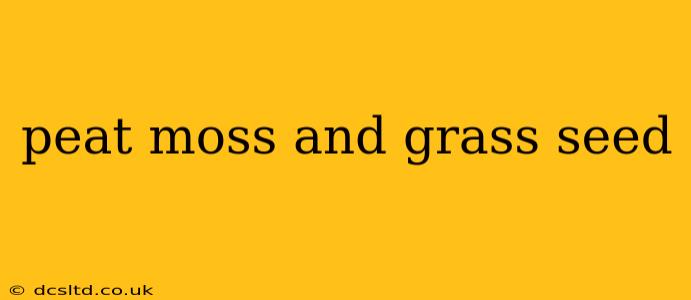Peat moss and grass seed are frequently used together in lawn establishment and renovation, but understanding their relationship is key to achieving a healthy, thriving lawn. This guide explores the benefits of using peat moss with grass seed, addressing common questions and concerns. We’ll delve into the science behind their synergy, providing you with the knowledge to make informed decisions for your own lawn care.
What are the Benefits of Using Peat Moss with Grass Seed?
Peat moss, a naturally occurring material composed of partially decayed sphagnum moss, offers several advantages when mixed with grass seed:
-
Improved Water Retention: Peat moss is highly absorbent, holding significantly more water than soil. This is crucial for newly sown seeds, ensuring consistent moisture for germination and early root development. Dry spells are less likely to damage your new seedlings when using peat moss.
-
Enhanced Drainage: While retaining water, peat moss also improves drainage. It prevents waterlogging, a common problem that can suffocate grass seeds and hinder growth. This balance between water retention and drainage creates the ideal environment for seed germination.
-
Aeration and Soil Structure: Peat moss loosens compacted soil, improving aeration. This allows for better root penetration and oxygen uptake by the developing grass plants. This is particularly beneficial in heavy clay soils.
-
Nutrient-Rich Environment: While not a fertilizer itself, peat moss contributes to a more nutrient-rich environment by increasing the soil's ability to retain essential nutrients, making them more readily available to the germinating seeds.
-
Seed Protection: The fine texture of peat moss provides a protective layer around the seeds, shielding them from harsh weather conditions and erosion. This gentle bedding creates a more stable environment for healthy germination.
Does Peat Moss Help Grass Seed Germinate Faster?
While peat moss doesn't directly speed up germination, it creates an optimal environment that significantly supports faster and more successful germination. The consistent moisture and improved soil structure provided by peat moss contribute to a higher germination rate and stronger seedling establishment. This translates to a quicker, denser lawn.
How Much Peat Moss Should I Use with Grass Seed?
The ideal ratio of peat moss to grass seed varies depending on your soil type and the specific needs of your lawn. Generally, a good starting point is a 1:1 or 2:1 ratio of peat moss to topsoil. For very sandy soils, a higher proportion of peat moss might be beneficial. For clay soils, a lower ratio might be preferable to avoid creating overly water-retentive conditions. Always check the instructions on your specific grass seed packaging for recommendations.
Is Peat Moss Necessary for Planting Grass Seed?
Peat moss is not strictly necessary, but it significantly enhances the chances of successful grass seed germination and establishment, especially in challenging soil conditions. For optimal results, particularly in areas with poor drainage or compacted soil, using peat moss is highly recommended.
What is the Best Peat Moss for Grass Seed?
Look for horticultural-grade peat moss, specifically designed for use in gardening and landscaping. Avoid using peat moss that is heavily treated with fertilizers or other chemicals. The quality and purity of the peat moss are important for ensuring a healthy growing environment for your grass seeds.
Are There Alternatives to Peat Moss for Planting Grass Seed?
Yes, there are alternatives to peat moss, including coconut coir, which is a sustainable alternative derived from coconut husks. Compost can also improve soil structure and water retention. However, peat moss remains a popular choice due to its effectiveness and readily available nature.
By understanding the benefits and proper usage of peat moss with grass seed, you can significantly improve your chances of establishing a lush, healthy lawn. Remember to choose high-quality peat moss and follow the appropriate mixing ratios for optimal results. Happy gardening!
